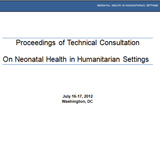
Background: This technical consultation on neonatal health in humanitarian emergencies was organized to address the critical gap in neonatal health services. Since the Lancet neonatal survival series, the evidence base in neonatal health has expanded. There are more data on neonatal health in developing countries than ever before, but the evidence base in conflict and disaster settings remains limited. To our knowledge this was the first meeting that brought together experts in development and humanitarian settings, to share practical and scientific information on neonatal survival strategies. The meeting also reviewed the efforts of the existing network of agencies and partnerships to build on scientific evidence and best practices to address priority areas in neonatal health in humanitarian settings.
Purpose: The main purpose of the consultation was to serve as a platform for the exchange of scientific evidence and strategies on neonatal survival and provide the humanitarian community an opportunity to share resources and guidelines in neonatal survival. The specific objectives of the meeting were as follows: 1) develop expert consensus on a basic package of services (interventions, commodities, and indicators) for neonatal health in humanitarian settings; 2) explore methodologies to measure neonatal mortality in humanitarian settings; and, 3) identify and set operational research priorities on neonatal health in humanitarian settings.
Results:The consultation drew attention to a number of critical issues. The agenda included an overview of the global epidemiology of the burden of neonatal mortality and morbidity, effective interventions, research gaps, and neonatal mortality measurement. Lastly, case studies from the field grounded discussions in the realities and challenges of working in the field to scale-up known interventions, such as strengthening human resources capacity and health systems.
Work groups were formed to develop consensus and prioritize the most pressing issues related to saving neonatal lives in humanitarian settings. The intervention group focused on prioritizing interventions needed the most at the community and health facility level during an emergency. The medical kit group developed a list of essential commodities for each level of care based on cost-saving approaches. The operational research group reviewed a list of 28 priority questions and identified four that were the most critical. The indicator group listed a minimum set of indicators that should be collected to provide data on neonatal health for improved public health action. Lastly, the neonatal mortality group developed options that could be implemented by humanitarian agencies to measure the burden of neonatal mortality.
Conclusions: During the two-day meeting, the dual perspectives provided by the development and humanitarian communities the recognition recognized the urgent need to provide practical solutions for neonatal survival in emergencies. The issues discussed focused on identifying the ways and means to move forward with concrete solutions supported by a multi-disciplinary group of experts